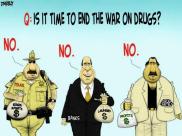When I write an everything-you-need-to-know column, I’m inevitably guilty of hyperbole.
All that I’m really doing is highlighting a very compelling example of how politicians make a mess of just about anything they touch.
That’s even true in the rare cases when they’re trying to enact policies I prefer.
The crux of the problem is that politicians like having some level of power and control over various sectors of the economy,  for the simple public choice-driven reason that they can then extort bribes, campaign cash, and other goodies.
for the simple public choice-driven reason that they can then extort bribes, campaign cash, and other goodies.
Which is good news for donors, crooks, and cronies, as P.J. O’Rourke wisely noted.
But it’s bad news for those of us who don’t like sleaze. Yet sleaze is almost inevitable when politicians have power to interfere with private market transactions.
Check out these excerpts from a Politico report.
In the past decade, 15 states have legalized a regulated marijuana market for adults over 21, and another 17 have legalized medical marijuana. But in their rush to limit the numbers of licensed vendors and give local municipalities control of where to locate dispensaries, they created something else: A market for local corruption.
Almost all the states that legalized pot either require the approval of local officials – as in Massachusetts — or impose a statewide limit on the number of licenses, chosen by a politically appointed oversight board, or both. These practices effectively put million-dollar decisions in the hands of relatively small-time political figures – the mayors and councilors of small towns and cities, along with the friends and supporters of politicians who appoint them to boards. …They have also created a culture in which would-be cannabis entrepreneurs feel obliged to make large campaign contributions or hire politically connected lobbyists. …It’s not just local officials. Allegations of corruption have reached the state level in numerous marijuana programs, especially ones in which a small group of commissioners are charged with dispensing limited numbers of licenses.
Needless to say, what’s happening in the marijuana industry happens wherever and whenever politicians have power.
“All government contracting and licensing is subject to these kinds of forces,” said Douglas Berman, a law professor at Ohio State University who authors a blog on marijuana policy. …“There’s a lot of deal-making between businesses and localities that creates the environment of everyone working their way towards getting a piece of the action,” Berman said. Whether it’s city or county officials that need to be appeased, local control is “just another opportunity for another set of hands to be outstretched.”
The report concludes by noting that corruption can be avoided very simply. Just make sure politicians and other people in government have no power or authority.
States that have largely avoided corruption controversies either do not have license caps — like Colorado or Oklahoma — or dole out a limited number of licenses through a lottery rather than scoring the applicants by merit — like Arizona. Many entrepreneurs, particularly those who lost out on license applications, believe the government shouldn’t be in the business of picking winners and losers and should just let the free market do its job.
Amen.
I’ll conclude by noting that politicians are doing the right thing in the worst way.
I want to end the War on Drugs because it is a costly failure. It’s not that I think drug use is a good idea. But I recognize that the social harm of prohibition is greater than the social harm of legalization.
 And, as a libertarian, I believe people should be free to make their own decisions (consistent with the libertarian non-aggression principle, of course), even if I happen to disapprove.
And, as a libertarian, I believe people should be free to make their own decisions (consistent with the libertarian non-aggression principle, of course), even if I happen to disapprove.
Sadly, politicians are not legalizing pot for libertarian reasons.
Instead, they see it as a way of having a new product to tax (and they’re botching that). And, as illustrated by today’s story, they see it as a way of lining their own pockets.
I’m almost tempted to say we’d be better off if marijuana was criminalized so it could be sold on the black market instead.
But the real moral of the story is that government power is a recipe corruption.

